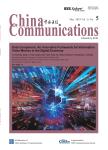Steady-State Performance Evaluation of Linux TCPs versus TCP Wave over Leaky Satellite Links
Steady-State Performance Evaluation of Linux TCPs versus TCP Wave over Leaky Satellite Links作者机构:Department of Electronics Engineering University of Rome "Tor Vergata" Via del Politecnico 1 Rome 00133 Italy
出 版 物:《China Communications》 (中国通信(英文版))
年 卷 期:2017年第14卷第3期
页 面:17-30页
核心收录:
学科分类:0810[工学-信息与通信工程] 080904[工学-电磁场与微波技术] 0808[工学-电气工程] 0809[工学-电子科学与技术(可授工学、理学学位)] 0839[工学-网络空间安全] 08[工学] 080402[工学-测试计量技术及仪器] 0804[工学-仪器科学与技术] 081001[工学-通信与信息系统] 0812[工学-计算机科学与技术(可授工学、理学学位)]
主 题:TCP satellite internet leaky channels Linux ns 3
摘 要:Internet access is becoming even more heterogeneous, including different wireless backhauling links, with Ka-band satellites as a possible alternative. Since communication path is unknown a priori, adoption of PEP solutions to optimize TCP performance over satellite is discouraged to allow dynamic network reconfigurations. To opposite, an endto-end TCP performance evaluation on such a challenging scenario, with possible large latency and transmission losses, is herein considered of paramount importance. Several TCP variants exist to tackle different aspects of communication networks. In Linux, the different TCP congestion control schemes differ from the theoretical formulations and RFC specifications, introducing a varying set of optimizations and options. This aspect makes difficult to identify a standard/reference TCP version for the proposed scenario, while testing with the real protocol stacks is deemed necessary to obtain consistent results. In addition, an innovative end-to-end TCP, namely TCP Wave, is introduced to replace the traditional window-based transmission with a burst-based strategy, representing a valid alternative to Linux TCP. To offer a fair, realistic and comprehensive evaluation, we configured a simulation setup where different Linux TCPs can be run within ns-3 network simulator and compared with TCP Wave.



